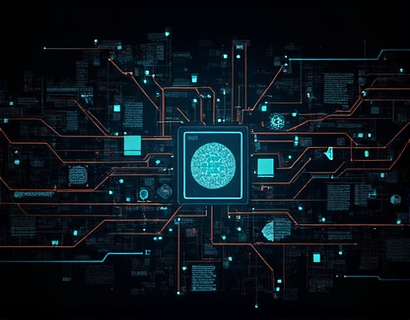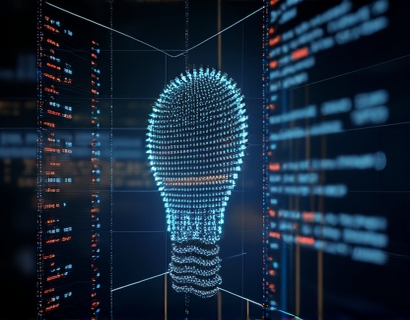Unlocking Digital Efficiency: Leveraging AI and Crypto for Enhanced Productivity Solutions
The integration of artificial intelligence (AI) and cryptocurrency is revolutionizing the way we approach digital productivity. This fusion of technologies is not just a trend but a transformative shift that promises to redefine workflows and daily tasks. For tech innovators and early adopters, understanding this synergy is crucial to staying ahead in the rapidly evolving digital landscape. This article explores how AI and cryptocurrency are converging to create next-generation solutions that enhance productivity and streamline operations.
The foundation of this transformation lies in the unique capabilities of AI and cryptocurrency. AI brings intelligent automation, predictive analytics, and personalized experiences to the table. It can process vast amounts of data, identify patterns, and make decisions with minimal human intervention. On the other hand, cryptocurrency offers a decentralized, secure, and transparent way to conduct transactions and manage assets. When combined, these technologies can create robust systems that are not only efficient but also resilient and trustworthy.
AI-Driven Automation
One of the most significant impacts of AI on digital productivity is automation. AI can automate repetitive and time-consuming tasks, freeing up human resources for more strategic and creative work. For instance, AI-powered tools can manage scheduling, email responses, and data entry with high accuracy and speed. This not only reduces the workload but also minimizes human errors, leading to higher quality outcomes.
Moreover, AI can predict and optimize workflows. By analyzing historical data and current trends, AI algorithms can identify bottlenecks and suggest improvements. This predictive capability ensures that resources are allocated efficiently, and tasks are completed in the most optimal manner. For businesses, this means reduced operational costs and increased productivity.
Enhanced Decision-Making with AI
AI's ability to process and analyze large datasets provides invaluable insights that can drive better decision-making. Businesses can leverage AI to gain a deeper understanding of customer behavior, market trends, and operational performance. These insights enable companies to make informed decisions, adapt to changes quickly, and stay competitive.
For example, AI can analyze customer feedback and social media data to gauge sentiment and identify areas for improvement. This real-time feedback loop allows businesses to respond promptly and effectively, enhancing customer satisfaction and loyalty. In addition, AI can forecast market trends and consumer preferences, helping companies to innovate and stay ahead of the curve.
Cryptocurrency and Decentralized Systems
Cryptocurrency plays a pivotal role in enhancing digital productivity by providing a decentralized and secure framework for transactions and data management. Unlike traditional financial systems, cryptocurrencies operate on blockchain technology, which ensures transparency, immutability, and security. This makes them ideal for applications that require trust and reliability.
One key application is in the realm of digital identity and access management. Cryptocurrency-based identity solutions can provide users with control over their personal data, ensuring that it is securely stored and shared only with authorized parties. This not only enhances privacy but also reduces the risk of identity theft and fraud.
Smart Contracts and Automated Agreements
Smart contracts, a feature of blockchain technology, are self-executing contracts with the terms directly written into code. They automatically enforce and execute agreements when predefined conditions are met, eliminating the need for intermediaries. This automation reduces transaction costs, speeds up processes, and minimizes the potential for disputes.
In a business context, smart contracts can streamline supply chain management, payment processing, and contract negotiations. For instance, a smart contract can automatically release payment to a supplier once the goods are delivered and verified by a third-party auditor. This ensures that all parties adhere to the agreed terms, fostering trust and efficiency.
Tokenization of Assets and Incentives
Tokenization, the process of converting assets into digital tokens on a blockchain, is another innovative application of cryptocurrency in enhancing productivity. By tokenizing assets, businesses can create fractional ownership, making it easier for multiple parties to invest and benefit from a single asset. This democratizes access to investment opportunities and can lead to more efficient capital allocation.
Moreover, tokens can be used as incentives to motivate and reward employees. For example, a company can issue tokens to employees based on their performance, which can later be redeemed for various rewards. This token-based incentive system aligns employee goals with company objectives, driving higher productivity and engagement.
Integration of AI and Cryptocurrency
The true power of AI and cryptocurrency is realized when they are integrated seamlessly. This synergy can lead to the development of advanced productivity solutions that leverage the strengths of both technologies. For instance, AI can enhance the functionality of decentralized applications (dApps) by providing intelligent and adaptive features. Similarly, cryptocurrency can ensure secure and transparent transactions within AI-driven ecosystems.
One potential application is in the development of AI-powered marketplaces that use cryptocurrency for transactions. These marketplaces can utilize AI to match buyers and sellers based on preferences and past behavior, while ensuring that all transactions are secure and traceable. This creates a trustless environment where participants can transact with confidence.
Challenges and Considerations
While the potential benefits are significant, there are also challenges and considerations to keep in mind. One major challenge is the regulatory landscape. The intersection of AI and cryptocurrency is a relatively new territory, and regulations are still evolving. Businesses and developers must stay informed about legal requirements and ensure compliance to avoid risks.
Another consideration is the technical complexity. Integrating AI and cryptocurrency requires a high level of technical expertise. Organizations need to invest in skilled personnel or partner with experts to develop and maintain these systems effectively. Additionally, ensuring the security and privacy of data is paramount, as both AI and cryptocurrency systems handle sensitive information.
Future Outlook
Looking ahead, the combination of AI and cryptocurrency is poised to drive further innovations in digital productivity. As technology advances, we can expect more sophisticated AI algorithms and more robust blockchain networks. These advancements will lead to even more efficient and intelligent systems that can handle complex tasks with ease.
Moreover, the adoption of these technologies is likely to grow across various industries, from healthcare and finance to education and manufacturing. As more organizations recognize the benefits, the ecosystem will continue to expand, fostering collaboration and innovation.
In conclusion, the fusion of AI and cryptocurrency represents a significant leap forward in digital productivity. By harnessing the power of intelligent automation and decentralized systems, businesses and individuals can achieve unprecedented levels of efficiency and effectiveness. For tech innovators and early adopters, embracing this synergy is essential to thriving in the digital age.










































